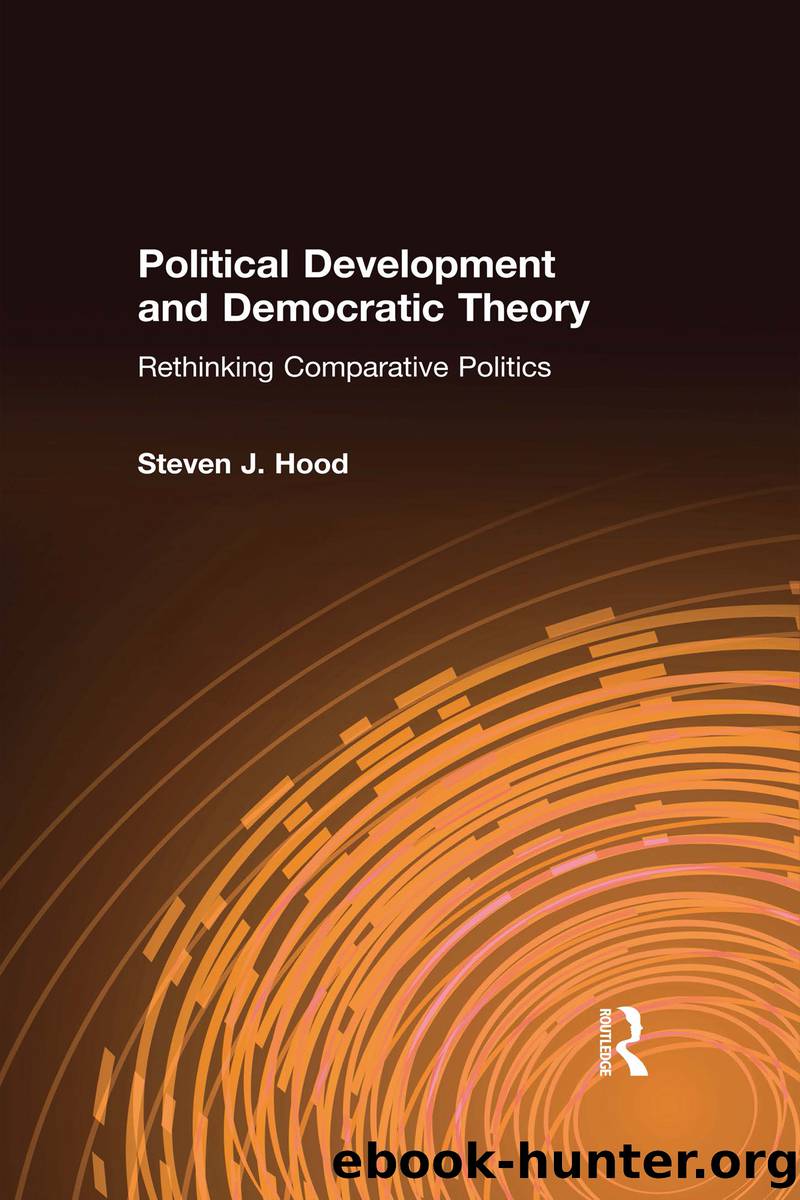Political Development and Democratic Theory by Hood Steven J.;

Author:Hood, Steven J.;
Language: eng
Format: epub
Publisher: Taylor & Francis Group
Published: 2004-08-15T00:00:00+00:00
The above three points speak to consolidation as a phenomenon that contains principles that go far beyond mere elections. They speak to the existence of a civil society akin to the notion of civil society common to the established Western democracies of North America and West Europe. A consolidated democracy is free of authoritarian thinking and the trappings of authoritarianism. It is an acknowledgement that democracy is the only acceptable regime. Civil life operates autonomously, and the economic sector is free to operate without government interference. Indeed, all kinds of institutionsâreligious, interest-based, civic, and economicâfunction freely. To a great extent, civil life enables citizens to create their own rales of conduct and to act as the conscience of democratic society. In a consolidated society, civil and political societies merge, and citizens find they have multiple interests and identities, be they ethnic, religious, economic, political, or interest-based. Arid because political society must answer the demands of civil society and provide political policy, it establishes constitutional limits to both empower and limit government in a democratic society. Laws come to embody democratic philosophy and provide a template for acceptable democratic behavior in addition to legitimizing government through administrative rules and responsibilities.37 Political institutions like political parties, representative bodies, electoral processes, and government ministries are respected. Liberal freedoms based on political rights for all people are constitutionally guaranteed.38 By this standard, we see the real strength of Taiwan compared to Peru. A vibrant civil society has emerged in Taiwan, and the method of measuring government performance and quality of private life in Taiwan is by democratic criteria. Sadly, civil society in Peru is poorly developed. People still look to government for answers to most of their problems without being able to build and rely upon institutions of their own making to improve life in Peru. This presents President Toledo with a formidable taskâto develop democracy in Peru behaviorally, attitudinally, and constitutionally in hopes of building not only a democratic government, but also a civil society.
The differences between the definitions given by Linz and Stepan and Prezworski and others are readily apparent. To date, Linz and Stepan's understanding of consolidation has found widespread acceptance. It is notable that recent scholarship on consolidation focuses more on political attitudes, thinking about democracy, and the concerns of democratic political philosophy rather than simply the procedural functions of democracy. This is apparent from the criteria used above to define consolidation. It is a scholarly trend that is a vast improvement over earlier efforts to understand what lends to democratic stability because we consider more of what day-to-day life is like in a democratic regime rather than focusing on a single criterion like elections. There are philosophical and practical concerns that must be addressed in studying consolidation. Recent scholarship has given us ambitious criteria to meet, so we now ask the question: How does a democracy consolidate? What are the conditions, factors, and forces that have proven useful and dangerous in the process of consolidation?
Download
This site does not store any files on its server. We only index and link to content provided by other sites. Please contact the content providers to delete copyright contents if any and email us, we'll remove relevant links or contents immediately.
Chaco's Northern Prodigies : Salmon, Aztec, and the Ascendancy of the Middle San Juan Region after AD 1100 by Paul F. Reed(338)
Law Enforcement Interpersonal Communication and Conflict Management by Brian Douglas Fitch(331)
Digital International Relations by Unknown(327)
Critical Perspectives on Human Security : Rethinking Emancipation and Power in International Relations by David Chandler; Nik Hynek(315)
Skilled interpersonal communication: Research, theory and practice, Fifth edition by Owen Hargie(311)
The Enduring Color Line in U.S. Athletics by Krystal Beamon Chris M. Messer(309)
Evidence-Based Policy Making in Labor Economics by Hamermesh Daniel S.;Nottmeyer Olga K.;Nottmeyer Olga;King Sarah;King Sarah;King Sarah;(279)
EPSO CAST Political affairs EU policies: How to succeed in the selection procedure by Franco Reverte José María(272)
Writing Public Policy - A Practical Guide to Communicating in the Policy Making Process by Catherine F. Smith(256)
Criminological Theory in Context by John Martyn Chamberlain(250)
Threshold Concepts in Women's and Gender Studies by Christie Launius Holly Hassel(249)
Tibeton Yoga Its Secret Doc by Evans-Wentz(245)
Positive Psychology and Spirituality in Counselling and Psychotherapy (Conflict, Ethics, and Spirituality, 12) by unknow(245)
Rothschild and Early Jewish Colonization in Palestine (Geographical Perspectives on the Human Past) by Ran Aaronsohn(245)
Social Problems, Social Issues, Social Science by James Wright(243)
Play in child development and psychotherapy: toward empirically supported practice by Sandra W. Russ(239)
Cognitive Development in Infancy and Childhood (Elements in Child Development) by Mary Gauvain(235)
Latin American Politics and Society by Gerardo L. Munck & Juan Pablo Luna(210)
What Makes a Social Crisis?: The Societalization of Social Problems by Jeffrey C. Alexander(206)
